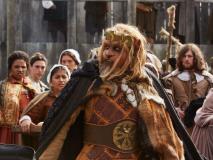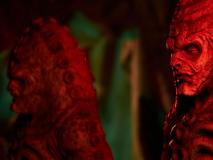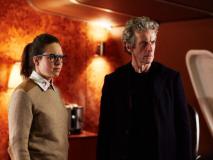 Last weekend over 50,000 people attended the Comic Con Germany in Stuttgart. One of the stars invited was Torchwood’s John Barrowman, so a surprising number of attendees cosplayed characters from Doctor Who or Torchwood. But Germany’s obsession with the Doctor is fairly new and for a long time the show has been struggling to get any recognition even among Science Fiction fans. Here is a timeline of Doctor Who in Germany:
Last weekend over 50,000 people attended the Comic Con Germany in Stuttgart. One of the stars invited was Torchwood’s John Barrowman, so a surprising number of attendees cosplayed characters from Doctor Who or Torchwood. But Germany’s obsession with the Doctor is fairly new and for a long time the show has been struggling to get any recognition even among Science Fiction fans. Here is a timeline of Doctor Who in Germany:
The 60’s – Missed opportunities
It was in 1965 that the BBC offered a German channel a selection of William Hartnell stories. An offer which was never taken up. In 1968 the German public channel ZDF received an audition print of The Ice Warriors. A jury should decide if the serial was worth airing on German television. The protocol reads (translated to English):
Dr. Who and the Ice Warriors, Utopian series
Result: rejected.
A new ice age has gripped Earth. A motley crew of scientists fights a losing battle to overcome the problems. The now moving glaciers release beings from other planets stranded with their spaceship on Earth hundreds of thousands of years ago.
Scenery and costumes of the films are as naive as the scripts are obscure.
The rejection was unanimous.
If ZDF had picked up this serial and even more stories from the 60’s, many lost episodes would likely still exist, since German TV back then was already archiving most of their shows for repeat purposes.
The 70’s – Doctor Who wasteland
During the 70’s Doctor Who was nowhere to be seen on German television. Although there was one curious sidestep in print. The German erotic magazine Plaisir published the famous “nude Katy Manning and the Dalek” photo on its cover, with a feature inside. This magazine is a rarity now and it is not known if the TV show was explained to the readers of the magazine, who most likely had never heard of Doctor Who.
The 80’s – Doctor Who makes its debut in print and on German TV
In 1980 the German young adult books publisher Schneider released two Target novelisations, “Der Planet der Daleks” (Planet of the Daleks) and “Kampf um die Erde” (translates to “Fight for Earth”, better known as The Dalek Invasion of Earth). Both novels were heavily edited.
It was not a German TV channel that debuted Doctor Who in (West-)Germany. Instead the English language European Super Channel showed a few Tom Baker stories in the mid-80’s. Not many Germans would have watched them, though.
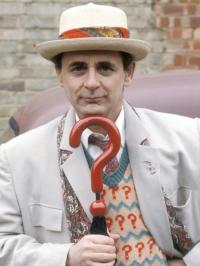
Finally in 1989 the commercial TV channel RTL Plus made a deal with BBC Enterprises to broadcast the Sylvester McCoy episodes of Doctor Who. The show was dubbed into German, with the actor Michael Schwarzmaier providing the voice for the Doctor and Carin Tietze the voice for Ace.
The series started on Wednesday, 22nd November 1989 at 1.05pm with the first episode of “Terror auf Lakertia” (Time and the Rani). Before that there was a short introduction to the program with producer John Nathan-Turner and Sylvester McCoy summarising the history of the show for German audiences. Episode 2 aired on Sunday afternoon, with each subsequent episode airing on the same day.
Interestingly RTL Plus broadcasted the serials in production order, not in the same order as it had been transmitted in the UK. The last serial therefore was “Das Hause der Tausend Schrecken” (translates to “The house of a thousand horrors”, better known as Ghost Light), instead of “Der Tod auf leisen Sohlen” (“Death on silent feet” or Survival).
Doctor Who Magazine reported in September 1990 that the Sylvester McCoy run attracted around 2 million viewers and that RTL Plus was looking into buying Jon Pertwee serials in colour, although this never seemed to have gone any further than negotiations.
With no new episodes after Series 26 it appeared Doctor Who’s broadcast in Germany ended just a little while after it began.
The 90’s – Certainly no years of wilderness in Germany
Shortly after the RTL Plus broadcast, German books publisher Goldmann released six Target novels translated to German.
1 Die Invasion the Daleks (Doctor Who and the Daleks)
2 Das Komplott der Daleks (The Dalek Invasion of Earth)
3 Der Planet der Daleks (Planet of the Daleks)
4 Tod den Daleks (Death to the Daleks)
5 Der Schöpfer der Daleks (Destiny of the Daleks)
6 Das Kind von den Sternen (An Unearthly Child)
The first book included a chapter on the history of Doctor Who on TV and print. Bizarrely the book cover of The Daleks featured Tom Baker and the cover of Destiny of the Daleks featured William Hartnell. The novelizations of Daleks Invasion of Earth and Planet of the Daleks featured a different translation than the one in the Schneider books from the 80’s and were also unedited this time.
In 1991 comics publisher Condor released the popular DWM comic strips featuring the sixth Doctor and Frobisher in three parts.
RTL Plus repeated Seasons 24 to 26 in 1993, on Fridays and Saturdays shortly after midnight. This time the serials were edited together as long omnibus editions.
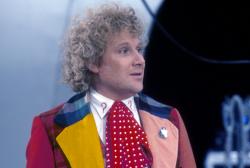
Viewers then had to wait until 1995 for new material. Commercial TV channel VOX bought all Colin Baker stories and dubbed them into German. The Doctor was again voiced by Michael Schwarzmaier. VOX also bought the anniversary special “Die Fünf Doktoren” (The Five Doctors) which was the first story to be transmitted. The 90 minute feature was edited into a three-parter with many scenes missing. Again Michael Schwarzmaier dubbed every incarnation of the Doctor, giving each one a unique voice.
After “Die Fünf Doktoren” aired, VOX transmitted every available Colin Baker episode Monday to Friday in the early morning. Strangely, they started with the last serial “Das Urteil” (Trial of a Time Lord) and worked their way backwards until “Zweimal Einstein” (The Twin Dilemma). VOX repeated the run immediately after (again backwards), but after that it would take more than a decade until Doctor Who returned to TV screens in Germany.
More and more genre magazines started to appear in the mid 90’s, so it was only a matter of time until they would run articles on that “curious british cult TV show”. Space View, a magazine comparable to the UK's SFX, ran a two part article about Doctor Who. Other magazines started to feature more and more news on the show, especially in the wake of the new TV movie featuring Paul McGann.
The TV Movie arrived in Germany in 1997 as a VHS, at first to rent, later on the shelves to buy. It was dubbed to German but hasn’t been transmitted on TV to this day.
The 90’s also saw the first kind of “fandom” appear in Germany. In 1995 the fan club Worshippers of Xoanon was formed which later published a quarterly fanzine called Time Scoop. The club started out with only a handful of people, meeting up regularly to watch the latest imported VHS or sharing their New Adventures novels collection and talking about convention appearances in the UK they were lucky to attend. For the first few years the club had around 10 to 20 members, but since then grew immensely.
2000 – today: Doctor Who takes a while but finally arrives
Some members of the fan club started the first podcast called Whocast in 2006, discussing Big Finish releases, reviewing stories and bringing news about the new TV show. The Whocast became pretty popular after a while and still runs to this day. It was the second podcast about Doctor Who worldwide.
When Doctor Who returned to British TV screens in 2005 the few German fans existing had to wait a while longer for its return. Commercial channel Pro7 finally bought Series 1 and 2 in 2008, dubbed them and aired the episodes every Saturday afternoon. The ratings were disappointing though, so they cancelled the show after the transmission of “Der Dritte Weltkrieg” (World War Three), only to continue with Dalek a few weeks later at a different timeslot. After the Series 2 finale, Pro7 announced they were not interested in purchasing further episodes of Doctor Who. Would German viewers now never get to know who the mysterious bride in the TARDIS would be?
One year later, in 2009, another channel picked up a show belonging to the Doctor Who universe. RTL 2 aired the first episode of Torchwood on 11th March 2009. Although most viewers will have never heard of Doctor Who, its spin-off quickly developed into a success for the channel, leading them later into buying Series 3 and 4. Doctor Who fans were hopeful that RTL 2 might give Doctor Who another chance but that scenario never happened.
Fans still had to wait until 2012 to see new episodes of Doctor Who. FOX Germany, a subscription channel, bought the license for Doctor Who and started to broadcast from Series 5 onwards. Although fans were a bit disappointed Series 3 and 4, as well as the Specials, were never shown, the Series 5 broadcast was a huge success for FOX. Quickly they started to transmit Series 6 and after that dubbed the “missing stories” of the David Tennant era. Fans finally got to know about the mysterious bride.
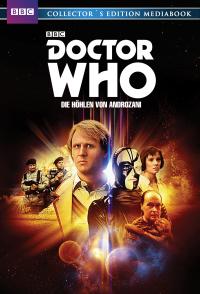
In 2013, around the 50th anniversary of Doctor Who, the show seemed to be everywhere in the media. The German press didn’t ignore it anymore, the cinema showings of the anniversary special sold out in many cities and the internet, facebook, tumblR and co helped to build the fandom.
Around 2013 Panini Comics started to release the Titan comic books in Germany and books publisher Cross Cult began releasing Doctor Who novels. The relatively young DVD production company Pandastorm Pictures released boxed sets with Classic Who stories that were already dubbed to German. To this day they released all Colin Baker and Sylvester McCoy stories, The Five Doctors and the TV Movie. As these DVD’s sold extremely well, they are now starting to dub stories that were never seen before on German television. The first release will be “Die Höhlen von Androzani” (The Caves of Androzani) and they just announced a second release, “Die Auferstehung der Daleks” (Resurrection of the Daleks). The fifth Doctor played by Peter Davison will once again be voiced by Michael Schwarzmaier.
In 2015 three fans founded the company TimeLash Event. They started a crowdfunding that ultimately made nearly twice as much money as they needed in order to do a Doctor Who convention, the first one ever in Germany. The con was held in October 2015 in Kassel and featured guests such as Paul McGann, Nicola Bryant, Nicholas Briggs, Terry Molloy, Terrance Dicks, Catrin Stewart, Andrew Cartmel and many more. Since then TimeLash has become a well-established annual Doctor Who convention, which usually sells out months before the date.
Not long after TimeLash the BBC sent Peter Capaldi and Jenna Coleman for a visit to Berlin, finally acknowledging the fandom in Germany.
Now
After the success on the subscription-only channel FOX, Doctor Who could also be streamed at iTunes, Netflix, Amazon Prime, among others.
Recently the public channel ONE, belonging to the ARD-group, picked up the show and repeated all available episodes, most of them for the first time ever on a free-to-air channel. Reports recently came in that the viewing figures for the target audiences are better than anything else that channels broadcasts.
 Many new products have been announced in Germany recently.
Many new products have been announced in Germany recently.




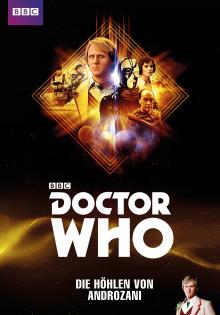

 German DVD distributor
German DVD distributor 
